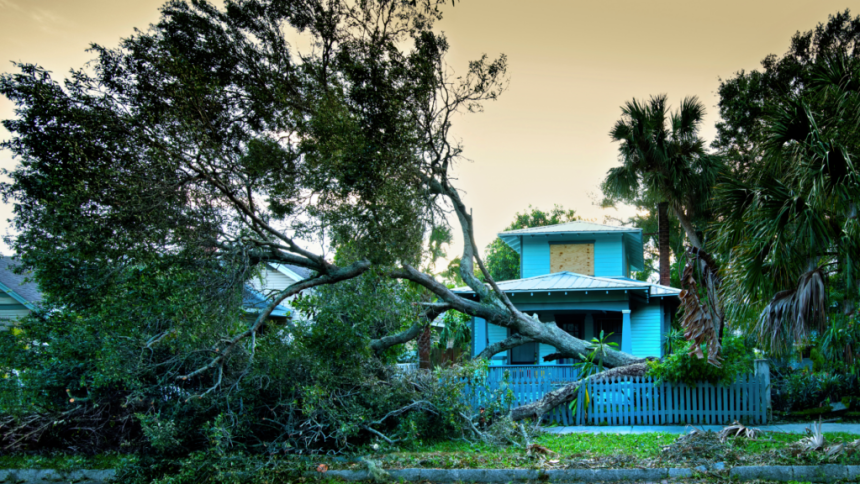As hurricane season begins, experts are sounding the alarm.
The 2025 season could bring up to 19 named storms, including potentially five major hurricanes, marking an above-average year for the Atlantic basin.
Homeowners are urged to prepare now and understand tax relief options that may soften potential financial hardships due to rising repair costs. Last year, Hurricane Helene caused over $78 billion dollars in damages, according to the National Oceanic and Atmospheric Administration (NOAA). Hurricane season runs from June 1 through Nov. 30 each year.
“Hurricanes can be financially devastating,” says Paul Miller, a certified public accountant (CPA) and managing partner of Miller & Company in New York City. “Beyond property damage, there’s often a major disruption to employment and income, plus out-of-pocket costs for temporary housing, food and repairs.”
The good news is that homeowners can get at least some financial and tax relief after a natural disaster strikes. From claiming casualty loss deductions to taking more time to file your tax return, there are key tax breaks that can help.
“The financial recovery process can stretch for years, and having access to tax relief can make a meaningful difference,” Miller says.
1. Claim a casualty loss deduction
If you experience damage from a hurricane, you may be able to claim a casualty loss deduction on your federal income tax return. A casualty loss refers to damage or destruction, or an unusual event, such as a hurricane, tornado, or flood.
For tax years 2018 through 2025, individuals can claim a casualty loss only if the event is a federally declared disaster. If your loss isn’t attributed to a federally declared disaster, you generally won’t be able to claim it.
“Unless Congress extends these provisions from the Tax Cuts and Jobs Act (TCJA), we’ll likely revert to the pre-2018 rules, which allowed individuals to deduct personal casualty losses even when not linked to a federally declared disaster,” Miller says.
If that happens, it “would broaden the deduction again and could benefit taxpayers experiencing localized or personal property damage that isn’t declared a disaster area by the federal government,” he says.
To calculate the amount of your claim, start with the smaller of the property’s cost or the decrease in its value. Then, subtract the following items:
When these reductions are taken into account, the amount left over is your casualty loss deduction.
Under current tax rules:
- To claim a casualty loss, you typically need to itemize your deductions using Schedule A and complete Form 4684, which reports gains and losses from casualties and thefts.
- However, if the loss is considered a qualified disaster loss, which is a specific catastrophic event identified by the IRS (you can find a list here), you can claim the deduction without itemizing. A qualified disaster loss is not subject to the 10 percent reduction in AGI, and the $100 subtraction increases to $500. It is best to seek a CPA or tax professional to help you deduct the correct amount on your tax return.
When filing your tax return, you’ll need to provide documentation substantiating your casualty loss. That’s why it’s a good idea to take photos and videos of your home and personal property ahead of hurricane season, especially high-value items such as jewelry and collectibles. IRS Publication 584 helps taxpayers document a list of personal property. Here’s more on how homeowners can prepare for a hurricane.
2. Exclude gains from a home sale after a hurricane
In some cases after a hurricane, you may decide to sell your home. Typically, after you sell a property at a gain, the profit is taxable, but most homeowners qualify for a valuable capital gain tax exclusion.
Specifically, if the home was your primary residence for at least two out of five years before the sale, you’ll likely qualify to exclude up to $250,000 of the gain from your taxable income or up to $500,000 if you’re married and filing jointly.
To qualify for the gain exclusion, you must meet the ownership and use test, which requires that you both owned and lived in the home as your main residence for at least two of the five years leading up to the sale. You’re generally not eligible for the exclusion if you’ve already claimed it on another home sale within the past two years.
However, if you lose your home due to a natural disaster, such as a hurricane, you may still qualify to exclude some of the gain — even if you don’t fully meet the ownership and use tests — under the IRS’ unforeseeable circumstance provision.
Under this provision, the IRS allows you to qualify for the gain exclusion if your home was destroyed due to a hurricane or other disaster. You can find more information on this IRS page to see if you qualify.
3. Special tax rules for retirement withdrawals
If you’re impacted by a natural disaster, such as a hurricane, special tax relief may apply to retirement account withdrawals and repayments.
A withdrawal made due to a hurricane may count as a qualified disaster recovery distribution. While the amount is generally taxable, you won’t face the 10 percent early withdrawal penalty, normally applied to those under age 59 ½ who withdraw from a retirement account like an IRA or 401(k).
To qualify, your withdrawal must:
- Be from an eligible retirement plan, including a 401(k) or a traditional, SIMPLE or Roth IRA.
- Be no more than $22,000.
- Occur on the date of the disaster or later, but no more than 180 days later than the date of the disaster declaration (or the date the disaster started or Dec. 29, 2022, whichever is later).
There are additional eligibility rules. Check out this IRS page for more.
The IRS allows you to choose to report the full amount in the year of distribution or spread the taxable income evenly over three years. For example, if you received a $24,000 qualified disaster recovery distribution in 2025, you can include $8,000 in 2025, 2026 and 2027.
You also have the option to repay the full amount within three years from the day of receiving the distribution. If you repay the distribution, the withdrawal is no longer taxable. However, you may need to amend the prior year’s tax return to reflect the repayment.
Miller suggests if you withdraw funds through a qualified disaster distribution and later decide to repay the amount, you should track your repayment carefully. Also, you must report both the original distribution and repayment amount on Form 8915 (the specific version depends on the disaster year).
4. Penalty relief and more time to file
After a severe hurricane or other natural event, the IRS typically extends the deadlines to file and pay taxes, and may offer penalty relief. If you live in a federally declared disaster area, generally you don’t need to contact the IRS — the IRS automatically identifies affected taxpayers.
However, in some cases — for example, if you recently moved to the area where the disaster happened — you may need to contact the IRS disaster assistance hotline at 866.562.5227.
If you’re affected by a hurricane or natural disaster, visit this IRS page on tax relief in disaster situations and this IRS FAQ page, or call the hotline to learn what specific tax relief options are available to you.
Read the full article here














